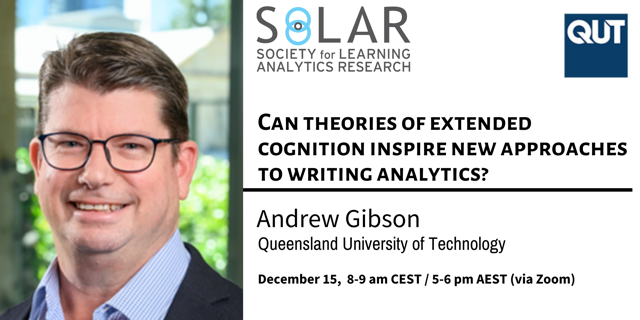Register for the next SoLAR Webinar: Can theories of extended cognition inspire new approaches to writing analytics?
November 30, 2022

Upcoming Webinar: December 15, 8-9 AM CEST / 5-6pm AEST
Much of writing analytics has been based on assumptions that words represent concepts held by the writer, and that identification of concepts can tell us something about the writer's learning. The heart of this idea is that the brain makes an internal model that represents the external world, and that language allows expression of that internal representation such that others can share understanding. Thus, as the learner learns, their conceptual model develops, and we assess the extent of that development through the learner's communication. In the case of writing analytics, the learner's linguistic expression. This theory has been highly successful and has allowed significant advancement in the analysis of learner linguistic expression.
However, much of the success of this internalist representational approach is found in learning contexts that are tightly scoped with a relatively high degree of predictability in learner behaviour. As a result, many analytics technologies are dependent on these limitations. For example, the vast majority of natural language processing technologies that underpin writing analytics require the writer to hold a reasonable command of a common language such as English. This technology typically performs poorly with poor expression (such as inappropriate grammar or frequent mis-spelling), and often very poorly with non-pervasive languages (such as those from small non-western nations). Apart from the obvious equity issues with marginalising learners who do not have a reasonable command of a dominant language, this representational limitation can result in a disconnect between the subsequent analytics and the reality of the learner. This disconnect is exacerbated when the representations are limited to concepts that are assumed to be representations of an external world. In particular, this is a significant issue in situations that are highly contextual, such as when a learner engages in a process of personal reflection. While arguably critical to learning, quality reflection can be ill-defined, general in scope, emotionally laden, and involve multiple layers of conceptual complexity that are difficult to reconcile with specific linguistic features. Apart from simple recounts of events, reflection tends to extend well beyond the expression of mental representations of an external world, and thus demands a re-think of the assumptions fundamental to its analysis.
In this webinar, Andrew Gibson will use his research in reflective writing analytics as an example of how engaging with non-representational theories of extended cognition might allow writing analytics to overcome some of its current limitations. He will introduce some of the key features of 4e cognition theories, and highlight their potential benefits for writing analytics. Such theories demand new approaches to modelling, so Andrew will show how he is using principles derived from complex adaptive systems to align with 4e cognition in order to model reflexivity in learners. Andrew will conclude with some thoughts about how this kind of approach might apply to learning analytics more generally.
Bio
Dr Andrew Gibson is a Senior Lecturer in Information Science at Queensland University of Technology (QUT), Brisbane, Australia. His research centres on the analysis of reflexivity, particularly as it applies to learning.
Missed past SoLAR webinars? Check out our Webinar page to view all previously recorded webinars!
